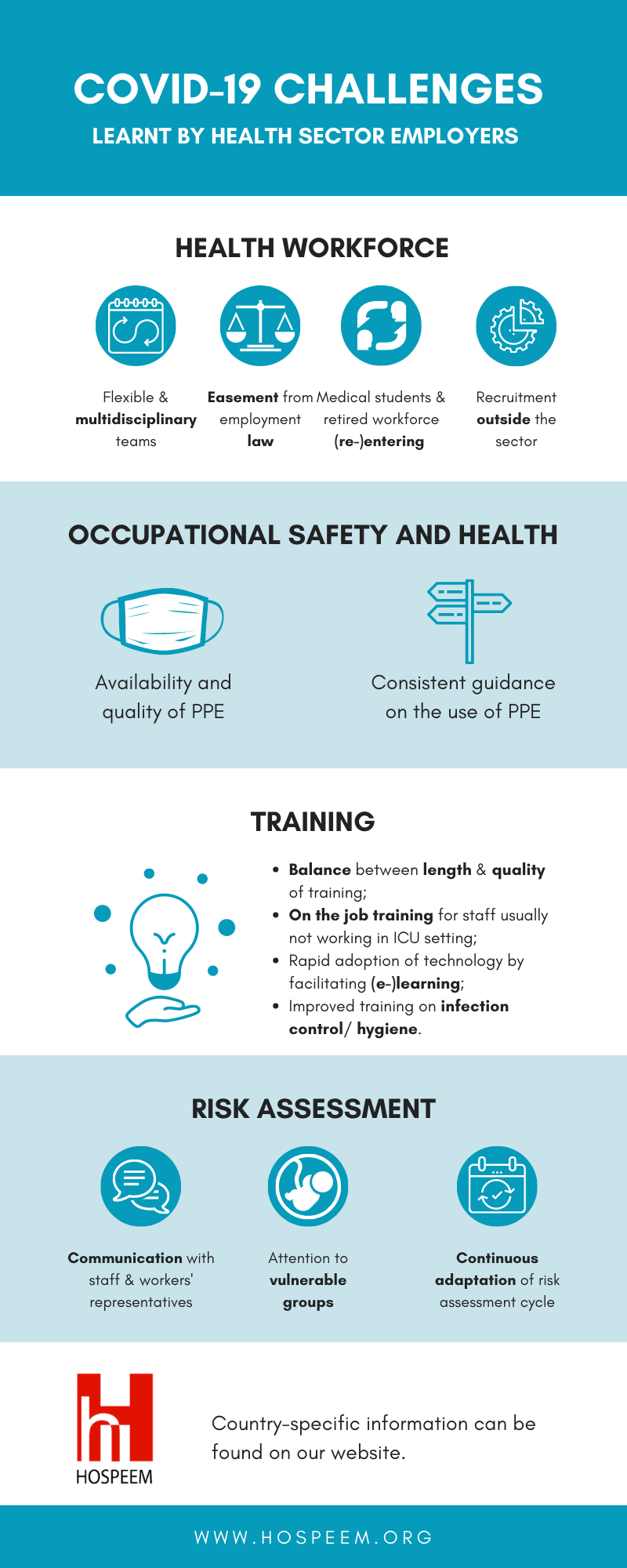Brussels, 13 November 2020
The European Hospital and Healthcare Employers’ Association (HOSPEEM) welcomes the opportunity to provide input to the envisioned Action Plan on the European Pillar of Social Rights, in particular on Principle 8, which encourages the EU Member States to support the increased capacity of social partners to promote social dialogue.
Since HOSPEEM’s recognition as European sectoral social partner in 2006, we have been active in capacity building of national employers’ organisation in forms of EU-funded projects, focusing among others on East Central and Southern Europe, including accession countries [1],[2],[3] and by participating in the Eurofound research study on capacity building for effective social dialogue in the European Union. Besides HOSPEEM’s recruitment efforts, we met with former European Commissioner Marianne Thyssen’s cabinet staff, raising awareness and inquiring support from the European institutions. Likewise, we have sent meeting requests to various Permanent Representations to the EU to discuss this very topic.
As the recently published Eurofound representativeness study for the human health sector revealed, there are nine EU Member States[4] where employer organisations exist and active in collective bargaining but are not affiliated to HOSPEEM. As a direct consequence, those organisations and countries do not have the opportunity to represent their national interest and contribute to the agenda-setting and decision-making in the frame of the European Sectoral Social Dialogue Committees. Additionally, their voices are not being heard when, for example, European sectoral social partners close framework agreements which can be transposed in binding legislation across the EU (cf. Council Directive 2010/32/EU). The study also noted that there are seven EU Member States[5] where “there is no sectoral employer organisation”.
Whereas HOSPEEM sees Eurofound’s findings as an excellent opportunity to increase its membership and hence its representation at European level, we also believe that European institutions and Members States miss the opportunity to draw on the full potential of EU legislation, such as TFEU Art. 154, further strengthening the delivery of a strong social Europe for just transitions.
We are aware that the existence of autonomous employer organisations, with the mandate to negotiate collective bargaining at the national level, is still limited in various EU Member States among others due to historical and organisational national structures. We, therefore, welcome the European Commission Communication on the 2020 European Semester: Country-specific recommendations highlighting that “a well-functioning social dialogue is key to ensure that measures taken are successful, inclusive and sustainable” and that “in some Member States there is clearly room for a better functioning social dialogue”.
To echo the quadripartite statement on the Relaunch of Social Dialogue[6], HOSPEEM would like to stress that trust, formal and timely consultation with the social partners as well as support through robust EU-funding is a pre-requisite for a well-functioning social dialogue. Furthermore, the independence of social dialogue and social partners from the national government and political influence is essential, to fully representing the interest of workers and employers alike.
We, therefore, call upon the European Commission, in collaboration with EU Member States and consultation with European social partners to develop coherent structures and implement robust mechanisms as well as initiatives for:
- the formation of employer organisations on a national level; and
- encourage already established employer organisations to become actively involved in European sectoral social dialogue structures while respecting national specificities and autonomy.
[4] Austria, Bulgaria, Estonia, Luxembourg, Romania, Slovenia, Slovakia, Spain, and Portugal (The Bulgarian employers’ organisation left HOSPEEM in beginning of 2020 and the Belgian employers’ organisation joined HOSPEEM mid-2020.)
[5] Cyprus, Czech Republic, Greece, Croatia, Hungary, Malta, and Poland
[6] co-signed by the European Commission, the European Council, and the cross-sectoral social partners in June 2016
Download the HOSPEEM response to the EPSRS (Pdf)
 The challenges and lessons learnt are clustered around four areas:
The challenges and lessons learnt are clustered around four areas:

 In this document you can find the highlights of the work of the HOSPEEM-EPSU Sectoral Social Dialogue Committee for the Hospital and Healthcare Sector. In 2020 the Sectoral Social Dialogue Committee for the Hospital and Healthcare Sector
In this document you can find the highlights of the work of the HOSPEEM-EPSU Sectoral Social Dialogue Committee for the Hospital and Healthcare Sector. In 2020 the Sectoral Social Dialogue Committee for the Hospital and Healthcare Sector 



Recent Comments